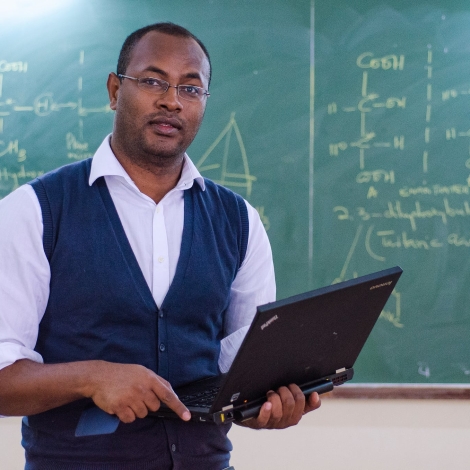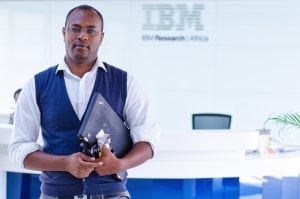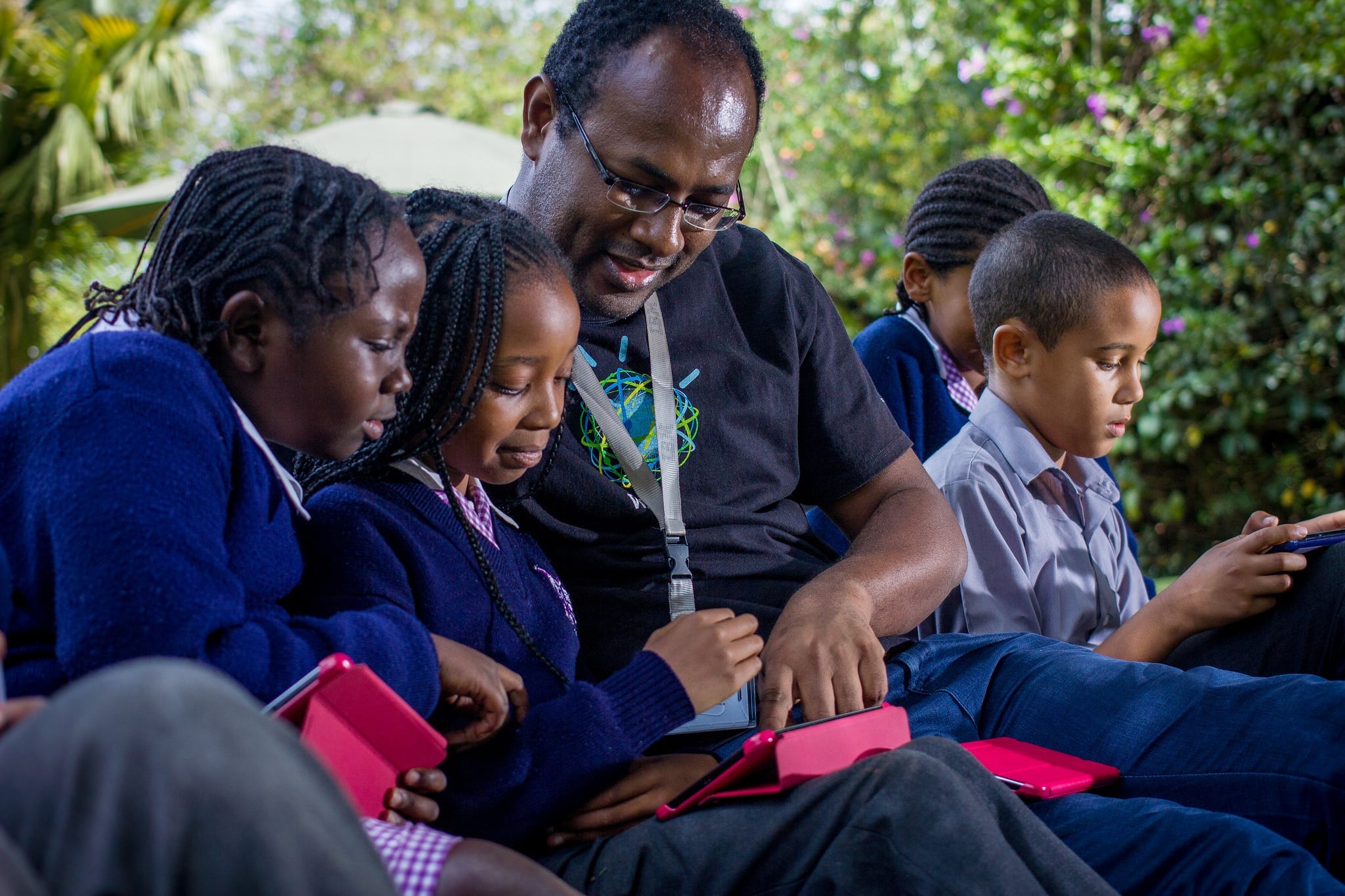Komminist Weldemariam is IBM’s first Master Inventor in the company’s African labs. Kommy, as he is known, owns 65 patents for inventions such as an aerial drone for reducing livestock parasites, a cognitive baby pacifier, a parking system for self-driving cars, a blockchain Web browser and intelligent water points in resource-constrained areas. He is also a prolific author of scientific papers, with published research on topics including sensors for detecting plant stress, instrumenting roads in Nairobi and school information hubs through blockchain, to name a few.
Dr. Weldemariam is a Research Scientist and Manager at IBM Research – Africa in Nairobi, Kenya. Before that post, he worked as a professor of computer science at Queen’s University at Kingston, Ontario in Canada, and as a scientist at the non-profit research institute Fondazione Bruno Kessler in Trento, Italy. Throughout his careers, Dr. Weldemariam has looked for ways to use and create technology to solve problems in social and economic development in the world’s underserved communities.
We asked Kommy Weldemariam five questions.
E4C: Your long list of patents suggests a Herculean work ethic. Would you describe a typical work day to share some insight into what it takes to accomplish what you have in your career?
KW: Herculean work ethic you say, I would just say that I am passionate and excited about what I do and committed to making a social and economic impact on the continent.
A typical day starts at 0630 hours and includes a lot of coffee, reading topics of interest, meetings and conference calls, research project reviews, team coaching and mentoring, coding, writing of papers, fielding patent applications, family, some food and more coffee; and the day ends 2100 hours.
The copious amount of coffee drinking is linked to my Ethiopian heritage.
“I saw the whole sequence of events playing out and tried to scream to catch her attention, but she did not hear me. This inspired me to come up with a patent to provide a real-time alert.”
The ideas for my publications and patents stem from my interaction with the environment that I live and work in and my observations of people as they engage with day-to-day life undertakings and considerations of what can be done to enhance their well-being.
An example of this would be my recent patent 9,846,999 was granted in December 2017—simply called “Smartphone safety system for pedestrians.” I came up with the idea for the patent while sipping coffee in one of Nairobi’s well-known coffee shops. I saw a woman crossing the street while she was texting on her mobile phone. She was hit by a car. I saw the whole sequence of events playing out and tried to scream to catch her attention, but she did not hear me in time to react. This inspired me to come up with a patent to provide a real-time alert to a user of a device in or near a potentially dangerous situation.
E4C: Your large body of work must position you to spot trends in technology that others might miss. What are some exciting uses of technology that you see improving lives in underserved communities today?
KW: The environment that I grew up in shaped my curiosity from an early age; and it went on to influence my areas of study and consequently my work and research. In my current role, I make a conscious commitment to marry innovation, technology and local relevance and context to address the challenges of those living in both served and underserved communities. By doing so, the ideas and solutions built address their challenges.
“Blockchain coupled with artificial intelligence and Internet of Things (IoT) edge-computing will give Africa the opportunity to leapfrog, re-imagining itself and its future.”
I am a believer that challenges create opportunities to create solutions that may address or create challenges. Blockchain technology is a testimony to this as it offers transparency, efficiency, immutability, auditability, longevity and security. Examples of where it is lending itself and providing significant benefit are identity, healthcare, supply chain, education, and financial services.
However, blockchain on its own does not realize its full potential unless it is coupled with artificial intelligence and Internet of Things (IoT) edge-computing. The novel combination will give Africa the opportunity in which to leapfrog in re-imagining itself and its future.
E4C: What advice do you have for other inventors and entrepreneurs who would like to make a positive difference in underserved communities?
KW: Embrace co-innovation and co-creation. For innovations (products, services, and/or solutions) to improve the quality of life in both served and underserved communities, they must be specific and contextually relevant in
addressing the perceived challenge. Africa is a continent of 54 countries and not one country as often perceived. So what works in Kenya may not work in neighboring countries.
Observe your environment, see challenges and consider possible answers.
E4C: Many of your patents are related to big data. What do you see on the horizon for big data at large and big data for global development in particular?
KW: Big Data has been called everything from the “new oil” to the “new currency,” and just like
its vast nomenclature, its vast potential has yet to be tapped or realized on the continent.
Big Data has spurred infrastructure development on the continent of Africa and vice versa—and accordingly there has been an explosion in the uptake of edge devices. Despite the excitement, the future and ability to derive and/or mine value from Big Data will be dependent on the quality and trustworthiness of the data—hence, the value of blockchain and AI.
“The ability to mine value from Big Data will be dependent on the quality and trustworthiness of the data—hence, the value of blockchain and AI.”
In terms of global development, the future is now, and big data powered by blockchain and AI will exponentially boost human intelligence by providing decentralized and trusted insights that will yield or equate to improved decision making, efficient systems, risk mitigation, higher profits and lower costs, etc.
E4C: Do you have a perspective that you could say is an “industry perspective” as a representative of IBM? If so, why is it, in your opinion, that IBM is interested in technology that advances economic development in Africa and other regions?
KW: IBM is committed to addressing Africa’s grand challenges—and to be able to achieve this vision, we cannot do the work single-handedly. We pride ourselves in our partnerships with the regional and international ecosystem. These partnerships include government, private sector, academia, research institutions, and
development partners. Examples of the projects we have partnered or continue to partner to deliver on include, but are not limited to, —see footnotes for related articles:
| Area of Research | Partner | Project |
|---|---|---|
| Blockchain | Maersk | A cross-border trade platform was developed in partnership—the pilot was done in Kenya and focused on the shipment of avocado out of the Port of Mombasa, Kenya to the Netherlands. (See Blockchain: A Better Way to Track Pork Chops, Bonds, Bad Peanut Butter?) |
| Water | USAID and Millennium Water Alliance (MWA) | Software system to manage water points, track borehole pumping volumes through sensors installed on pumps in boreholes, do water budget modeling, view/analyze 3R-potential as well as view landform and lithography information. (See New Partnerships Find Water in a Drought.) |
| Government | Government of Kenya | Improve Kenya’s ranking on the World Bank’s Ease of Doing Business Index. (See Tech Labs Improve Ease of Doing Business.) |
| Education | RTI International | Using data for accountability and transparency in schools. (See A Partnership for Data-Driven Development.) |
E4C: One more question… How can readers get involved?
KW: We need bright people to address these grand challenges. Therefore, anyone who is reading this article with skills in computer science and an interest in Africa please come and join me and my colleagues. Let’s change the world together.
“Let’s change the world together.”



